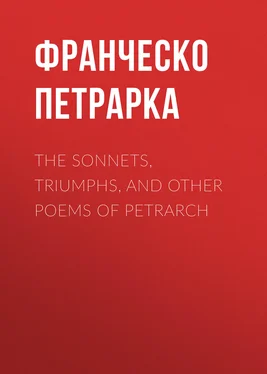Франческо Петрарка - The Sonnets, Triumphs, and Other Poems of Petrarch
Здесь есть возможность читать онлайн «Франческо Петрарка - The Sonnets, Triumphs, and Other Poems of Petrarch» — ознакомительный отрывок электронной книги совершенно бесплатно, а после прочтения отрывка купить полную версию. В некоторых случаях можно слушать аудио, скачать через торрент в формате fb2 и присутствует краткое содержание. Жанр: foreign_poetry, Поэзия, foreign_antique, foreign_prose, на английском языке. Описание произведения, (предисловие) а так же отзывы посетителей доступны на портале библиотеки ЛибКат.
- Название:The Sonnets, Triumphs, and Other Poems of Petrarch
- Автор:
- Жанр:
- Год:неизвестен
- ISBN:нет данных
- Рейтинг книги:5 / 5. Голосов: 1
-
Избранное:Добавить в избранное
- Отзывы:
-
Ваша оценка:
- 100
- 1
- 2
- 3
- 4
- 5
The Sonnets, Triumphs, and Other Poems of Petrarch: краткое содержание, описание и аннотация
Предлагаем к чтению аннотацию, описание, краткое содержание или предисловие (зависит от того, что написал сам автор книги «The Sonnets, Triumphs, and Other Poems of Petrarch»). Если вы не нашли необходимую информацию о книге — напишите в комментариях, мы постараемся отыскать её.
The Sonnets, Triumphs, and Other Poems of Petrarch — читать онлайн ознакомительный отрывок
Ниже представлен текст книги, разбитый по страницам. Система сохранения места последней прочитанной страницы, позволяет с удобством читать онлайн бесплатно книгу «The Sonnets, Triumphs, and Other Poems of Petrarch», без необходимости каждый раз заново искать на чём Вы остановились. Поставьте закладку, и сможете в любой момент перейти на страницу, на которой закончили чтение.
Интервал:
Закладка:
Stephano Colonna the younger had brought with him to Avignon his son Agapito, who was destined for the church, that he might be educated under the eyes of the Cardinal and the Bishop, who were his uncles. These two prelates joined with their father in entreating Petrarch to undertake the superintendence of Agapito's studies. Our poet, avaricious of his time, and jealous of his independence, was at first reluctant to undertake the charge; but, from his attachment to the family, at last accepted it. De Sade tells us that Petrarch was not successful in the young man's education; and, from a natural partiality for the hero of his biography, lays the blame on his pupil. At the same time he acknowledges that a man with poetry in his head and love in his heart was not the most proper mentor in the world for a youth who was to be educated for the church. At this time, Petrarch's passion for Laura continued to haunt his peace with incessant violence. She had received him at first with good-humour and affability; but it was only while he set strict bounds to the expression of his attachment. He had not, however, sufficient self-command to comply with these terms. His constant assiduities, his eyes continually riveted upon her, and the wildness of his looks, convinced her of his inordinate attachment; her virtue took alarm; she retired whenever he approached her, and even covered her face with a veil whilst he was present, nor would she condescend to the slightest action or look that might seem to countenance his passion.
Petrarch complains of these severities in many of his melancholy sonnets. Meanwhile, if fame could have been a balm to love, he might have been happy. His reputation as a poet was increasing, and his compositions were read with universal approbation.
The next interesting event in our poet's life was a larger course of travels, which he took through the north of France, through Flanders, Brabant, and a part of Germany, subsequently to his tour in Languedoc. Petrarch mentions that he undertook this journey about the twenty-fifth year of his age. He was prompted to travel not only by his curiosity to observe men and manners, by his desire of seeing monuments of antiquity, and his hopes of discovering the MSS. of ancient authors, but also, we may believe, by his wish, if it were possible, to escape from himself, and to forget Laura.
From Paris Petrarch wrote as follows to Cardinal Colonna. "I have visited Paris, the capital of the whole kingdom of France. I entered it in the same state of mind that was felt by Apuleias when he visited Hypata, a city of Thessaly, celebrated for its magic, of which such wonderful things were related, looking again and again at every object, in solicitous suspense, to know whether all that he had heard of the far-famed place was true or false. Here I pass a great deal of time in observation, and, as the day is too short for my curiosity, I add the night. At last, it seems to me that, by long exploring, I have enabled myself to distinguish between the true and the false in what is related about Paris. But, as the subject would be too tedious for this occasion, I shall defer entering fully into particulars till I can do so vivâ voce . My impatience, however, impels me to sketch for you briefly a general idea of this so celebrated city, and of the character of its inhabitants.
"Paris, though always inferior to its fame, and much indebted to the lies of its own people, is undoubtedly a great city. To be sure I never saw a dirtier place, except Avignon. At the same time, its population contains the most learned of men, and it is like a great basket in which are collected the rarest fruits of every country. From the time that its university was founded, as they say by Alcuin, the teacher of Charlemagne, there has not been, to my knowledge, a single Parisian of any fame. The great luminaries of the university were all strangers; and, if the love of my country does not deceive me, they were chiefly Italians, such as Pietro Lombardo, Tomaso d'Aquino, Bonaventura, and many others.
"The character of the Parisians is very singular. There was a time when, from the ferocity of their manners, the French were reckoned barbarians. At present the case is wholly changed. A gay disposition, love of society, ease, and playfulness in conversation now characterize them. They seek every opportunity of distinguishing themselves; and make war against all cares with joking, laughing, singing, eating, and drinking. Prone, however, as they are to pleasure, they are not heroic in adversity. The French love their country and their countrymen; they censure with rigour the faults of other nations, but spread a proportionably thick veil over their own defects."
From Paris, Petrarch proceeded to Ghent, of which only he makes mention to the Cardinal, without noticing any of the towns that lie between. It is curious to find our poet out of humour with Flanders on account of the high price of wine, which was not an indigenous article. In the latter part of his life, Petrarch was certainly one of the most abstemious of men; but, at this period, it would seem that he drank good liquor enough to be concerned about its price.
From Ghent he passed on to Liege. "This city is distinguished," he says, "by the riches and the number of its clergy. As I had heard that excellent MSS. might be found there, I stopped in the place for some time. But is it not singular that in so considerable a place I had difficulty to procure ink enough to copy two orations of Cicero's, and the little that I could obtain was as yellow as saffron?"
Petrarch was received at most of the places he visited, and more particularly at Cologne, with marks of great respect; and he was agreeably surprised to find that his reputation had acquired him the partiality and acquaintance of several inhabitants. He was conducted by his new friends to the banks of the Rhine, where the inhabitants were engaged in the performance of a superstitious annual ceremony, which, for its singularity, deserves to be recorded.
"The banks of the river were crowded with a considerable number of women, their persons comely, and their dress elegant. This great concourse of people seemed to create no confusion. A number of these women, with cheerful countenances, crowned with flowers, bathed their hands and arms in the stream, and uttered, at the same time, some harmonious expressions in a language which I did not understand. I inquired into the cause of this ceremony, and was informed that it arose from a tradition among the people, and particularly among the women, that the impending calamities of the year were carried away by this ablution, and that blessings succeeded in their place. Hence this ceremony is annually renewed, and the ablution performed with unremitting diligence."
The ceremony being finished, Petrarch smiled at their superstition, and exclaimed, "O happy inhabitants of the Rhine, whose waters wash out your miseries, whilst neither the Po nor the Tiber can wash out ours! You transmit your evils to the Britons by means of this river, whilst we send off ours to the Illyrians and the Africans. It seems that our rivers have a slower course."
Petrarch shortened his excursion that he might return the sooner to Avignon, where the Bishop of Lombes had promised to await his return, and take him to Rome.
When he arrived at Lyons, however, he was informed that the Bishop had departed from Avignon for Rome. In the first paroxysm of his disappointment he wrote a letter to his friend, which portrays strongly affectionate feelings, but at the same time an irascible temper. When he came to Avignon, the Cardinal Colonna relieved him from his irritation by acquainting him with the real cause of his brother's departure. The flames of civil dissension had been kindled at Rome between the rival families of Colonna and Orsini. The latter had made great preparations to carry on the war with vigour. In this crisis of affairs, James Colonna had been summoned to Rome to support the interests of his family, and, by his courage and influence, to procure them the succour which they so much required.
Читать дальшеИнтервал:
Закладка:
Похожие книги на «The Sonnets, Triumphs, and Other Poems of Petrarch»
Представляем Вашему вниманию похожие книги на «The Sonnets, Triumphs, and Other Poems of Petrarch» списком для выбора. Мы отобрали схожую по названию и смыслу литературу в надежде предоставить читателям больше вариантов отыскать новые, интересные, ещё непрочитанные произведения.
Обсуждение, отзывы о книге «The Sonnets, Triumphs, and Other Poems of Petrarch» и просто собственные мнения читателей. Оставьте ваши комментарии, напишите, что Вы думаете о произведении, его смысле или главных героях. Укажите что конкретно понравилось, а что нет, и почему Вы так считаете.












